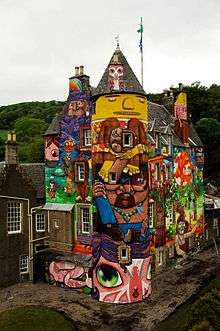Francisco Rodrigues da Silva

Francisco Rodrigues da Silva also known as "Nunca" is a Brazilian artist who uses a graffiti technique to create images that confront modern urban Brazil with its native past. His name Nunca ("Never" in Portuguese) is an affirmation of his determination not to be bound by cultural or psychological constraints.[1]
Background
He began his career at the age of 12 as a member of a gang spraying pichações - crude slogans and tag graffiti - on walls in Itaquera, the poor neighborhood in eastern São Paulo where the family lived. He adopted the tag Nunca to signify a rebellion against psychological and cultural constraints.[1]
Three years later, after the family moved to Aclimação, in the south-central part of the city, he made new friends and developed an interest in grafite, a more consciously artistic form. He has described this as a natural progression - he had always liked drawing. He started to produce striking, intensely coloured figures inspired by indigenous Brazilian culture that attracted first local and then foreign attention.[1]
Starting to receive invitations to exhibit in Europe he began to paint canvases and produce sculptures, rejecting a more radical stance that would deny him the opportunity to exhibit in galleries. Although enjoying his work on the street he was keen to produce more elaborate work and saw this as another natural progression.[1]
Influences and references
Nunca was described as "one of the rising stars of the São Paulo graffiti scene" in the 2005 book Graffiti Brazil [2] which devoted an entire chapter to his work. He has worked closely with other major figures on the São Paulo graffiti scene including Os Gêmeos (the artist twins Otavio and Gustavo Pandolfo) and Otavio Pandolfo's wife, Nina.[3]
Cultural impact
Having developed their reputation in São Paulo Nunca and the Pandolfos were invited to participate in a street-art exhibition at the Tate Modern Gallery in London that led to a significant re-evaluation of their work by their home city. Following the introduction by the Mayor of São Paulo Gilberto Kassab of the "Cidade Limpa" ("Clean City") law aimed at eliminating forms of visual pollution, including graffiti, an official clean-up campaign led to many images being lost and others damaged. A 680-meter mural painted by the Pandolfos, Nunca and Otavio Pandolfo's wife Nina on retaining walls along the 23 de Maio expressway was half-obliterated with gray paint despite having been officially approved. Recognition abroad of the significance of the artists' work stimulated a public discussion of what constituted art which led to the creation of a registry of street art to be preserved by the city of São Paulo.[3]
Exhibitions
Nunca has exhibited in Brazil at the Museum of Modern Art in São Paulo and around the world, notably in Greece at the AfroBrasil Museum[3][4][5] and in the UK at Tate Modern, the first major display of street art at a public museum in London. The brickwork of the Tate Modern's external walls was decorated with paintings 15 metres high by the artists featured in the exhibition, the Pandolfo twins and Nunca, Blu from Bologna, the Parisian artist JR, the New York collaborative group Faile and Sixeart from Barcelona.[3]
References
- 1 2 3 4 http://revistamarieclaire.globo.com/EditoraGlobo/componentes/article/edg_article_print/1,3916,1163949-1740-2,00.html "A força do novo grafite", MarieClaire.Globo.com April 2006 accessed 20.11.2010 Archived September 28, 2009 at the Wayback Machine
- ↑ http://www.coolhunting.com/archives/2005/11/graffiti_brazil.php Graffiti Brazil, Tristan Manco, Ignacio Aronovich and Louise Chin (Lost Art), and Caleb Neelon aka Sonik, publ Thames & Hudson, 2005, summary by Wendy Dembo
- 1 2 3 4 http://www.bloomberg.com/apps/news?pid=20601086&sid=ar4OrAXUisPQ&refer=latin_america
- ↑ http://www.designboom.com/contemporary/pixacao.html
- ↑ http://msn.lilianpacce.com.br/home/grafite-brasileiro-em-londres/